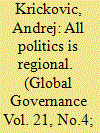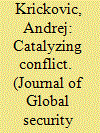|
|
|
Sort Order |
|
|
|
Items / Page
|
|
|
|
|
|
|
| Srl | Item |
| 1 |
ID:
142208


|
|
|
|
|
| Summary/Abstract |
Tip O'Neill famously claimed, “All politics is local.” As global governance falters and US leadership wanes, will “all politics” become regional with emerging powers (China, Russia, Brazil) taking responsibility for leadership at the regional level? While regional powers are providing effective leadership on free trade and financial stability, they have made much less progress on security issues where their approaches to certain problems, such as human security, diverge from those adopted by the West. Their ability to provide regional leadership is hampered by the increasing complexities of the modern world, including the conflicting dynamics of regionalism itself. The emergence of a centralized system of regional governance based on the hegemony of regional leaders is therefore unlikely. Instead, we are seeing the emergence of a complex and dynamic system of governance that includes a broad range of actors operating on multiple and overlapping levels.
|
|
|
|
|
|
|
|
|
|
|
|
|
|
|
|
| 2 |
ID:
145529


|
|
|
|
|
| Summary/Abstract |
Realists are accustomed to thinking about security competition between states in terms of the security dilemma: each state's efforts to improve its security can be taken as a threat by others, sparking competition that destabilizes the system and increases the likelihood of conflict. By focusing almost exclusively on external threat dynamics, however, common thinking about the security dilemma misses how domestic vulnerabilities can also be a catalyst for security competition. This is particularly the case in “weak” states that lack internal legitimacy. Weak developing states see intervention (whether perceived or real) targeted at their domestic vulnerabilities as an existential threat to political survival. When the targeted state responds to minimize or negate the threat, its response may be perceived as a threat, warranting a counter response. Particularly, when a targeted state possesses significant national power—as in the cases of China and Russia—a security competition is born. This article develops the logic behind this modified version of the security dilemma focused on internal vulnerabilities. Managing these internal fears will be of critical importance if we are to avoid the reemergence of security competition between great powers in the future.
|
|
|
|
|
|
|
|
|
|
|
|
|
|
|
|
| 3 |
ID:
175845


|
|
|
|
|
| Summary/Abstract |
Although recent scholarship has advanced our understanding of status, little attention has been paid to the factors that shape states’ status-seeking behaviour. Consequently, existing theories are unable to explain why Russia has been more aggressive and confrontational in its status-seeking than China. What is missing is a detailed examination of the ways in which status-seekers’ power trajectories affect their status-seeking behaviour. Whether a status-seeker is rising or in decline shapes its propensity to take risks in pursuit of status, its calculations regarding the utility of attaining more status, and its ability to use non-confrontational and non-aggressive status-seeking strategies to induce other states to accord it higher status. Declining powers, such as Russia, engage in aggressive status-seeking to avoid imminent status losses. Decliners need to initiate confrontations with other states to compel them to recognise their status. Risers, such as China, are more cautious and restrained. Recognising that aggressive status-seeking can jeopardise imminent gains, they are conscious of the costs that accompany elevated status. Their admirable successes and growing power, moreover, make other states all the more willing to accord them higher status. Risers, therefore, can enhance their status without resorting to aggressive or confrontational methods.
|
|
|
|
|
|
|
|
|
|
|
|
|
|
|
|
| 4 |
ID:
154663


|
|
|
|
|
| Summary/Abstract |
That Russia, a declining power, has emerged as the most assertive challenger to the US-led global order, while China, the most dynamic rising power, has largely worked within the established order, is surprising. It contradicts the expectations of power transition theory, which sees rising powers as the most likely challengers. This article tries to tackle this puzzle by examining the two states’ relative positions in the international system. China can grow and prosper by free-riding on the hegemonic order established by the United States, and is thus cautious about challenging it. As a declining power, Russia is dissatisfied with the order and determined to change it to reverse its decline and maintain its great power status. For the time being, the two great powers’ interests align. China uses Russia to push back against the aspects of US hegemony it dislikes (thereby avoiding the costs of a direct challenge), while Russia needs China’s backing to mount its challenge. However, going forward, the same structural dynamics that now favour the relationship may work against it: should Russia’s challenge start to destabilize the system it may also jeopardize China’s peaceful rise, causing rifts between the two powers. New US president Donald Trump has promised to seek a tougher line towards China and a rapprochement with Russia. However, given its strong structural foundations these policies are unlikely to weaken the China–Russia partnership, and could even strengthen it.
|
|
|
|
|
|
|
|
|
|
|
|
|
|
|
|
| 5 |
ID:
146259


|
|
|
|
|
| Summary/Abstract |
Nearly 70 years ago, George Kennan wrote his famous long telegram, later published as "The Sources of Soviet Conduct" in Foreign Affairs. Kennan's seminal article integrated material, ideological and historical factors into its analysis, developing a comprehensive and holistic approach to studying the foreign policy of the Soviet Union. Inspired by Kennan's work, this article outlines the structural, domestic, and ideational sources of contemporary U.S. policy towards Russia. These three factors reinforce a dominant narrative among U.S. policymakers that sees the U.S. as defending the status-quo against Russia's revisionist challenge to the post-Cold War international order. They shape the U.S. response to this perceived challenge, preventing the U.S. from seeking out an accommodation with Russia, but also discouraging it from immediately and forcefully confronting the "Russian threat"-even though many powerful domestic constituents lobby for this course of action.
|
|
|
|
|
|
|
|
|
|
|
|
|
|
|
|
| 6 |
ID:
160061


|
|
|
|
|
| Summary/Abstract |
Although a general task of social science is to measure and predict change, international relations (IR) paradigms and theories have been unable to keep up with the rapid pace and destabilizing effects of change in international politics. When addressing Russia, IR's “change problem” becomes clearer: the world's largest country is treated as an object struggling to adjust to changes rather than a protagonist introducing them into the system. Yet, twice within the last quarter century, Russia has acted as a catalyst for changes in international politics that few saw coming and which confounded IR paradigms. The Soviet leadership's decision to withdraw from the Cold War standoff and dismantle its empire in Eastern Europe was one of the most surprising events of the twentieth century. Russia's interventions in Ukraine, Syria, and the 2016 US presidential elections have similarly caught most observers by surprise. IR theories have struggled to account for these actions and have not been able to integrate Soviet/Russian behavior into their larger understanding of change in international politics.
|
|
|
|
|
|
|
|
|
|
|
|
|
|
|
|
| 7 |
ID:
136873


|
|
|
|
|
| Summary/Abstract |
Contrary to the expectations of liberal theories, interdependence between Europe and Russia in the energy sphere has exacerbated security tensions between the two sides, leading to the competitive foreign policies that now see them at loggerheads in Ukraine. Interdependence has not worked because both sides have been worried that in the future interdependence will become asymmetrical (that is, that they will become more dependent than the other side and that the other side will take advantage of this weakness) and they have adopted policies to reduce their exposure, but they cannot reduce their own dependence without also threatening to increase the dependence of the other side. As a result, the relationship looks like a classic security dilemma – where neither side can improve its own security without threatening the security of the other side. These findings dispel commonly held notions about the pacific effects of interdependence and show that interdependence can exacerbate security tensions, particularly when it is focused on one area and falls short of complex interdependence.
|
|
|
|
|
|
|
|
|
|
|
|
|
|
|
|
| 8 |
ID:
146810


|
|
|
|
|
| Contents |
Russia and NATO have failed to establish binding institutional arrangements and they are now locked in increasingly dangerous security competition. A closer look at two issue areas where their efforts at binding have failed—NATO enlargement and missile defence—shows that Russia and NATO find themselves facing a ‘catch 22’. They need binding arrangements to overcome the relative gains problems that inhibit security cooperation, yet their concerns about relative gains prevent them from establishing these arrangements in the first place. To overcome this dilemma, NATO and Russia have to craft binding arrangements that seriously address each side’s concerns about relative gains. Less formal and institutionalized binding arrangements may better serve this goal. Such arrangements will not put an immediate end to security competition, but they will help them build a higher level of trust, allowing them to gradually develop deeper and more comprehensive binding arrangements.
|
|
|
|
|
|
|
|
|
|
|
|
|
|
|
|
|
|
|
|
|